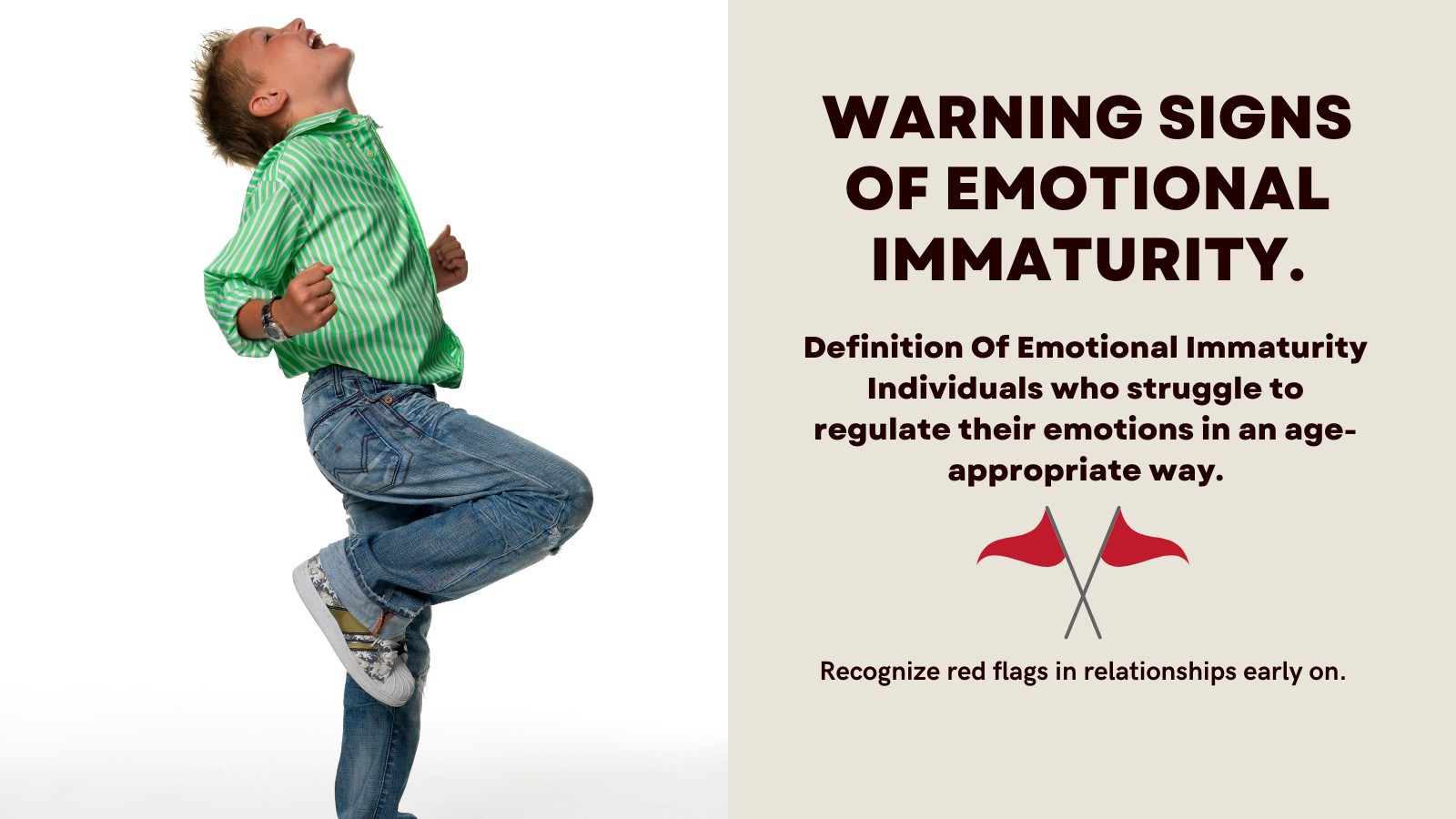Definition Of Emotional Immaturity
Individuals who struggle to regulate their emotions in an age-appropriate way. Emotional immaturity can negatively affect relationships. People who lack maturity can overreact to certain situations and have problems staying in control of their emotions. The worst example is those individuals who can go from normal to rage in a matter of seconds, it comes as a shock to see an adult behave in this way.
Anger outbursts, name calling and other behaviours linked with emotional immaturity can fall under the category of emotional abuse. So we need to be aware of the red flags whenever these behaviours show up in intimate relationships. Emotionally immature people exhibit similar characteristics as those with narcissistic personality disorder.
QUOTE
What Causes Emotional Immaturity?
Very Well Health
Although research isn’t clear on the exact cause of all cases of adult emotional immaturity, one factor is a strong association between being mistreated or abused as a child and the inability to develop parts of the brain.
An Example of Emotional Maturity vs. Emotional Immaturity
Real-world situations: When waiting in line, for example, an emotionally mature person will practice patience or calmly inquire about how much longer the wait is. An emotionally immature person will likely begin to feel frustrated or aggressive and might yell, curse, or leave the situation because they had to wait
Emotionally immature personalities may exhibit difficulties in verbal communication skills, thinking and making decisions, and their behaviour may become childlike at times. Temper tantrums and sulking for example.
Here are a few other signs to watch out for.
- Blaming others when things go wrong.
- Lying to get out of uncomfortable situations or conversations.
- Name-calling during conflicts.
- Inability to control one’s impulses, such as engaging in reckless behaviours.
- Needing to be the centre of attention at all times.
How does an emotionally immature man act?
Emotionally immature men often act without thinking about the consequences of their actions, leading to unpredictable and sometimes risky behaviour. They may be reckless when driving their car often driving too fast or too close to the vehicle in front. In the context of a relationship, this can manifest as sudden mood swings, irrational decisions, or spontaneous actions that could cause harm to the other person in the relationship.
Red Flags
Problems with regulating emotions.
Anger outbursts. Rage, clenched fists, banging their fists onto tables or into walls next to your head. Most mature adults can regulate their emotions when going through frustrations or disappointments. An emotionally immature man is unable to process feelings in a healthy way which results in the behaviour described above when they lash out. It is particularly difficult in an intimate relationship and these actions can be considered domestic violence if they are repeated in a pattern of behaviour that puts a woman in a place of fear. Another red flag.
Emotional maturity involves owning our actions and taking responsibility when we make mistakes. No one is perfect we all make mistakes, and we can learn and grow from our blunders. In contrast, an emotionally immature man will often blame others for his mistakes or failures. He might make excuses or even lie to avoid facing the consequences of his actions. In a relationship context, this can cause confusion and or conflict.
Difficulties With Emotional Intimacy.
Words and behaviours are telltale signs, saying or doing inappropriate things. Unable to open up and don’t like sharing their feelings. The emotionally immature spouse or partner may behave irresponsibly in intimate situations like an awkward teenager. There will be a lack of empathy, and a failure to consider the impact of his actions he will prioritize his own needs above yours.
Refusal to negotiate or come to any win-win resolution
The emotionally immature man will insist that everything is his way or the highway, you will have no say at all. There is an inability or refusal to negotiate or come to any win-win resolution. They can become argumentative if you propose an alternative to his ideal solution. It’s a red flag if he shuts down any attempts to talk things through or refuses to consider your input in big life decisions.
Failure to keep promises.
An emotionally immature man can make promises easily but there may be a failure to follow through. This may not impact the relationship too much if it is small promises like cutting the grass or taking the trash out every week. It can be a different matter if they fail to act on larger commitments or say one thing and do exactly the opposite. Making false promises is another huge red flag, the consequences of which will be huge mistrust, disappointment and maybe even resentment creeping into a relationship.
Relationship Issues.
Some emotionally immature men find it difficult to express love and affection in a show of feelings and intimacy, with hugs and cuddles. Instead these types of men with show up as generous gift givers, a way of buying your love with money and material things.
Causes
Studies have found various childhood traumas that lead to this type of behaviour. Neglect, abandonment issues, feeling vulnerable and even past heartbreak from early dating. Every situation is different but ultimately there will be some root cause deep down.
Personal Growth and Continuous Improvement.
Maturity and wisdom go hand in hand, it involves an understanding of self awareness and intuitive thought. Practising personal growth and mindset techniques helps us to overcome challenges and succeed in our transformation.
An emotionally immature man repeats the mistakes of his past over and over again, jumping from one relationship to another relationship without healing the childhood traumas. Unwilling to change and evolve or take full responsibility for his past actions.
If you find yourself in a relationship with an emotionally immature man it is important to recognise that you cannot force someone to change. Transformation is an individual choice and has to come from within, in the mindset first, then in the physical actions and then in the surrounding environment and relationships.


